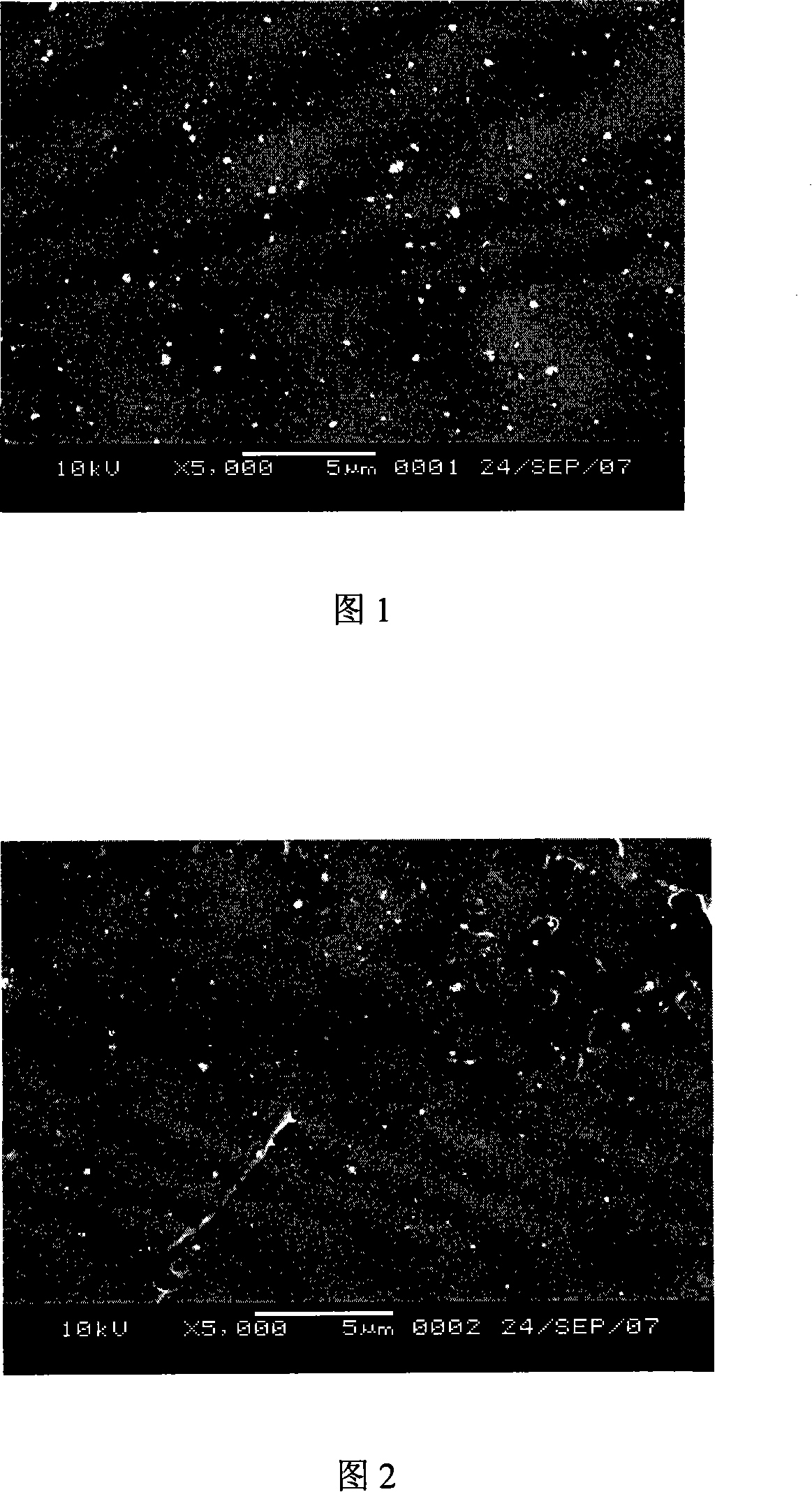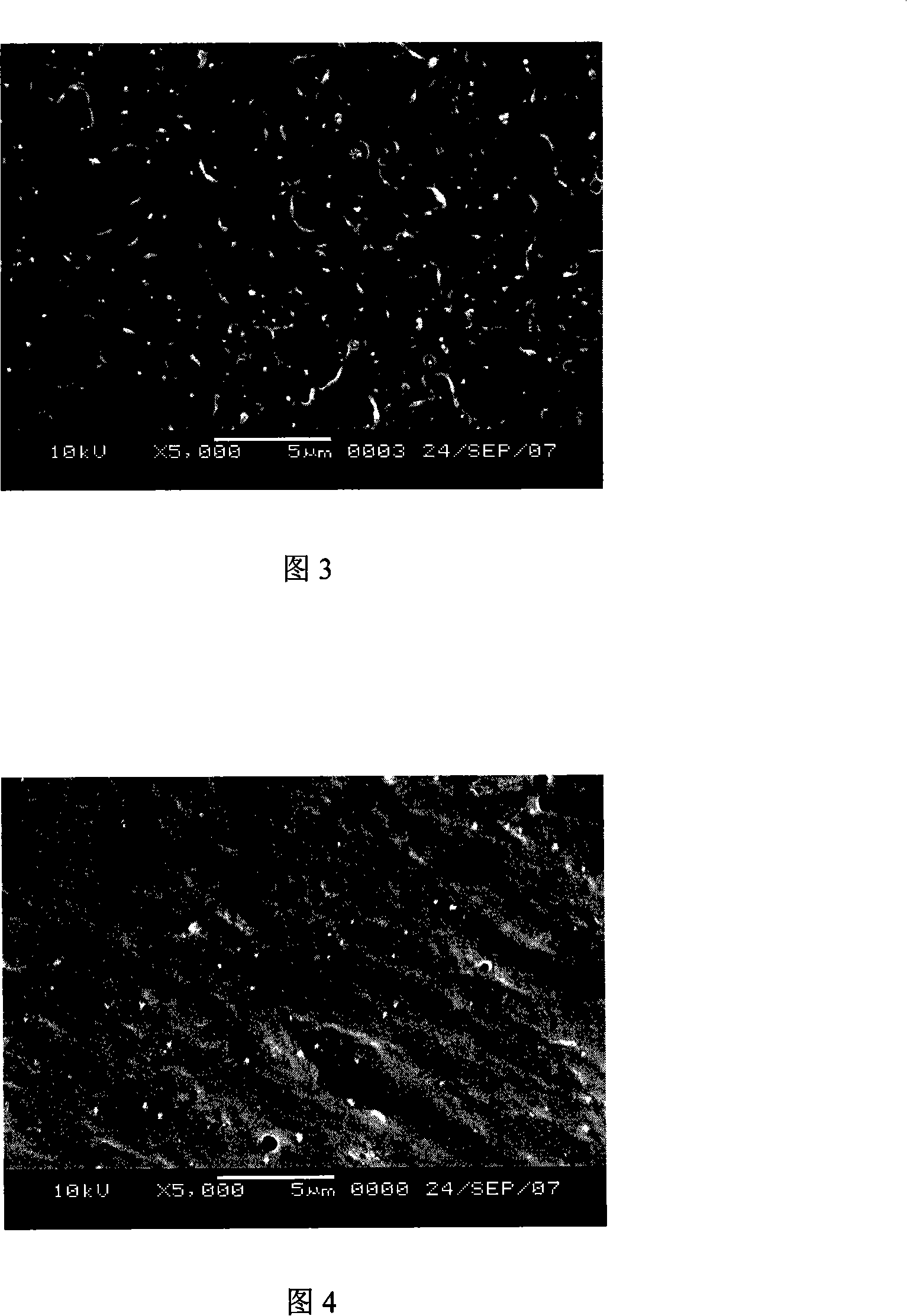Static electricity resisting polyethylene terephthalate modified resin
A technology of polyethylene terephthalate and diethyl phthalate, applied in the field of modified polyester, can solve the problems of restricting the application field, harming, affecting polyethylene terephthalate and the like
- Summary
- Abstract
- Description
- Claims
- Application Information
AI Technical Summary
Problems solved by technology
Method used
Image
Examples
preparation example Construction
[0014] I. Contain the preparation of the polyether of nano-antimony doped tin oxide:
[0015] Will C 2 ~C 10 Aliphatic dibasic acid, molecular weight (1~9)×10 3 Polyethylene glycol, toluenesulfonic acid (catalyst) and antioxidant 1010 or antioxidant 330 are placed in a polymerization reactor and reacted at 100°C to 180°C for 1 to 2 hours. In the initial stage of the polycondensation reaction, the reaction pressure is controlled at not higher than 0.2MPa; while in the late stage of the polycondensation reaction, it is controlled below -0.1MPa. Nano antimony-doped tin oxide (ATO) is dispersed in the prepared polyether melt, and the amount of ATO is 5% to 40% of the weight of the polyether to obtain the polyether containing nano-antimony doped tin oxide. Among them, antimony-doped tin dioxide (ATO) nanoparticles were prepared by chemical precipitation (Qin Changyong, Gu Hongchen. New multifunctional ATO ultrafine conductive powder materials. Shanghai Chemical Industry, 2000, 2...
Embodiment 1
[0025] Add 50g PEG6000, 0.9g malonic acid, 0.1g p-toluenesulfonic acid, 1g antioxidant 1010 into a 2L reaction kettle, blow the kettle 3 times with nitrogen, fill with 0.15MPa nitrogen, heat at 130°C for 30 minutes, add 10g Nano-antimony-doped tin oxide was continued to be heated for 20 minutes, vacuumed to -0.1MPa, vacuumed for 50 minutes, and the discharged material was naturally cooled to obtain polyether containing nano-antimony-doped tin oxide.
[0026] Add 830g of terephthalic acid, 363ml of ethylene glycol, 0.282g of antimony trioxide, 0.0173g of cobalt acetate, and 14μl of trimethyl phosphate into a 2L reaction kettle, heat to 100°C and stir for 40 minutes, blow the kettle with nitrogen for 3 Once, fill with 0.15MPa nitrogen, heat to 240°C for esterification and dehydration for 2 hours and 50 minutes, discharge 175ml of water, add the above-mentioned polyether containing nano-antimony doped tin oxide, stir for 15 minutes, and control the vacuum to -0.1MPa within 1 hour,...
Embodiment 2
[0029] Add 100g PEG6000, 1.8g malonic acid, 0.1g p-toluenesulfonic acid, 1g antioxidant 1010, and 10g nano antimony-doped tin oxide into a 2L reaction kettle, blow the kettle with nitrogen for 3 times, and fill with 0.1MPa nitrogen, Heating at 110°C for 40 minutes, evacuating to -0.1MPa, and evacuating for 1 hour, and cooling the discharged material naturally to obtain a polyether containing nanometer antimony-doped tin oxide.
[0030] Add 830g of terephthalic acid, 363ml of ethylene glycol, 0.282g of antimony trioxide, 0.0173g of cobalt acetate, and 14μl of trimethyl phosphate into a 2L reaction kettle, heat to 100°C and stir for 40 minutes, blow the kettle with nitrogen for 3 Once, fill with 0.15MPa nitrogen gas, heat to 240°C for 2.5 hours for esterification and dehydration, 173ml of water is discharged, add the above-mentioned polyether containing nano-antimony doped tin oxide, and then blow the kettle with nitrogen for 3 times, and vacuumize to -0.1 within 1 hour MPa, eva...
PUM
| Property | Measurement | Unit |
|---|---|---|
| particle size | aaaaa | aaaaa |
| specific surface area | aaaaa | aaaaa |
Abstract
Description
Claims
Application Information
 Login to View More
Login to View More - R&D Engineer
- R&D Manager
- IP Professional
- Industry Leading Data Capabilities
- Powerful AI technology
- Patent DNA Extraction
Browse by: Latest US Patents, China's latest patents, Technical Efficacy Thesaurus, Application Domain, Technology Topic, Popular Technical Reports.
© 2024 PatSnap. All rights reserved.Legal|Privacy policy|Modern Slavery Act Transparency Statement|Sitemap|About US| Contact US: help@patsnap.com









